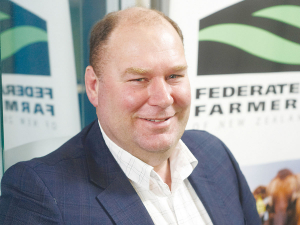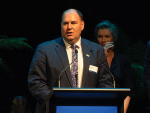We should always be open to debate whether we are doing the right thing. So much of the farm emission pricing discussions happened behind closed doors, meaning most farmers never got the chance to properly go on the journey to consensus between the 11 partners.
It’s also fair to say that things have changed since that farmer consultation, both inside and outside HWEN.
Inside HWEN, the final proposal to the Government was slightly different to that presented during consultation – for the better in my opinion, addressing many concerns we heard from our members.
Outside HWEN, a key thing that has changed is the counterfactual – i.e. ‘if it’s not HWEN then it’s the ETS’. In our own member survey, there was a higher number of respondents who favoured going with the farm level levy, as opposed to the processor levy, the ETS or just telling the Government to bugger off.
We heard loud and clear that a large reason for this view was due to concerns about the ETS ‘fallback’ option. Feds have constantly voiced opposition to the Government’s threat to bring agriculture into the ETS if HWEN does not work out.
In 2019 we called the ‘fallback option’ a show of poor faith. It has frustratingly further complicated an already complicated issue. Certainly, in our National Council deliberations, this weighed heavily on us – if Feds didn’t support HWEN, would we be held responsible for farmers going into the ETS?
However, I now question whether that ETS ‘fallback’ alternative is a likely outcome. Feds have always criticised bringing agriculture into the ETS, as designed at the processor-level in current legislation as unworkable, expensive, unscientific and a blunt tax on food production. We are increasingly not alone in saying this.
While there are aspects of the open letter that I am personally in agreement with, there are probably two aspects I disagree with.
Firstly, the call to farmers to question their Feds subscription. We cover a massive range of issues that affect farmers, and while you may not agree 100% with our stance on a singular issue at a certain point in time, I am sure I can point out nine others where you do.
Also, if you are upset about a certain issue, then the way to change that is to be more involved, not less.
The second aspect I would push back on is the conflation of the targets with HWEN.
The 2030 and 2050 methane reduction targets were set in the Climate Change Response Act, and quite frankly if we want changes to the targets it’s best done through that Act. Federated Farmers submitted that the targets should be based on what reductions are required for no additional warming to be caused by methane. This ‘no additional warming’ goal is the same as the goal set for long-lived gases.
Feds are advocating for methane to be treated the same on a warming basis as all other gases, a very reasonable policy. Using the best available science (including the science underpinning the GWP* metric) a 10% reduction in methane by 2050 adds no additional warming and is therefore ‘zero carbon’ equivalent.
There is a lot of talk about the need for farmer buy-in, but to achieve farmer buy-in farmers need to agree on both the ‘where’ (targets) and also the 'how' (HWEN).
Feds will continue to advocate for a mechanism of achieving targets in a way that is best for all our members and are open to their feedback, be they arable, beef, dairy or sheep.
Andrew Hoggard is national president of Federated Farmers.


















